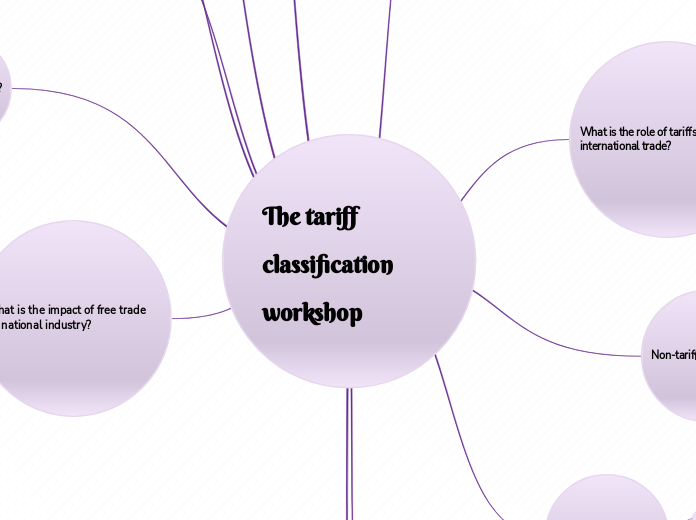The tariff classification workshop
the risks that occur in international trade are classified
1. Exchange risk: it is given by the variation in the time of exchange of different currencies, when a purchase and sale operation is given in a different currency than the national currency.
Add examples
2. Legal risks: It is given by bad writing of the contract and the conditions of the same one. Making clear each incoterm to have clear clauses in the contracts defining the responsibilities, possible nonconformities or litigations.
3. Logistic risks: everything that covers transfers, transshipments according to the type of goods to be transported, delivery times, packaging, specific conditions in the country of destination.
4. Risk of non-payment: failure to comply with the estimated time for payment.
What is the role of tariffs in international trade?
Basically they are the basis for identifying, classifying and valuing the goods to be exchanged. To control the entrance and exit of these according to the foreign trade policy of each country. In addition, commitments are established so that the goods have an impact on the final prices.
Non-tariff trade barriers
Non-tariff measure (i.e. that does not use tariffs and is based on taxes) that contains protection and therefore restricts the entry of a certain product or service in a market.
The types are:
Rules of origin
Import licenses
Sanitary standards
. Technical standards .
Government subsidies
support or economic benefit given by the state to national producers or exporters to encourage national industry to grow in foreign markets.
The tyoe of subsidies are:
.export subsidies
import subsidies
.employment subsidies
.tax subsidies.
Advantages:
Boost for the country.
Increased employability
Variety and competition in the market
What are the likely short- and long-term implications of protecting domestic tire companies with antidumping or other import duties?
domestic tire companies with anti-dumping or other import duties?
LONG TERM
FAIR PRICES
IMPORTS INCREASE
SHORT TERM
WEAKEN DEMAND
SET A MINIMUN PRICE
PRICES IN LINE WITH PRODUCT FOR PRODUCTION
What type of economy does China have, and what problem does this create when it comes to determining whether dumping has occurred
China's economy is dominated by the manufacturing and agricultural sectors and is the second largest economy in the world and the largest in terms of purchasing power parity, as well as being a global potential exporter. An example of dumping in China was in the export of tires because they were producers and also exporters at the lowest price creating a difference between the producers of natural rubber in China.
What is the purpose of the WTO?
The purpose of the WTO is to govern the rules that must be in place between countries that have already been signed and negotiated, to help producers of goods and services to trade with responsibility, regularity and quality.
At what point can antidumping duties be imposed?
Anti-dumping duties can be imposed when the exporter's domestic market, the price charged in another country, or a calculation based on the combination of costs and production. It can never be imposed if the import volume is less than 3%.
antidumping
it is a trade defense law within the scope of customs procedures.
What is dumping?
Short term impact of dumping on producers and consumers
that it generates a rebound effect,where producers come to a country with a price below their competition and then become monopolies. In addition, they come to damage the national production and industry, generating imbalances.
For consumers who may no longer feel so much a national identification if not they will prefer to buy foreign at lower prices.
Selling below the manufacturing price or cost of a product or service to challenge the market and competition.
Reasons for dumping chinese tyres in Indie
Due to low prices in China
por los beneficios que el gobierno ofrece por la exportacion
Short term impact of dumping on producers and consumers
What is the impact of free trade on national industry?
The great impact that this generates is that the national economy benefits by generating stability, prosperity, job creation and international relations
REFERENCES:https://www.edufinet.com/inicio/medios-de-pago/comercio-exterior/cuales-son-los-principales-riesgos-asociados-a-una-operacion-de-comercio-exterior/cuales-son-los-principales-riesgos-asociados-a-una-operacion-de-comercio-exterior https://www.icesi.edu.co/blogs/icecomex/2006/09/29/barreras-no-arancelarias/#:~:text=Que%20es%20una%20Barrera%20No,servicio%20a%20un%20determinado%20mercado. https://economipedia.com/definiciones/barreras-no-arancelarias.html https://unctad.org/topic/trade-analysis/non-tariff-measures/NTMs-classification https://librepensador.uexternado.edu.co/es-realmente-el-libre-comercio-el-enemigo-de-la-industria-nacional/ https://santandertrade.com/es/portal/analizar-mercados/china/politica-y-economia#:~:text=China%20tiene%20una%20econom%C3%ADa%20altamente,y%20consumidores%20de%20productos%20agr%C3%ADcolas. https://www.wto.org/spanish/thewto_s/whatis_s/whatis_s.htm file:///C:/Users/prestamosn/Downloads/HEC235-PDF-ENG%20(1).pdf
Disadvantages:
Export costs
Internal instability
Product counterfeiting
Low level of productivity
